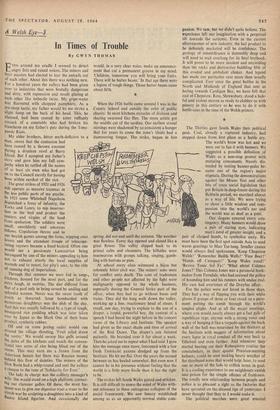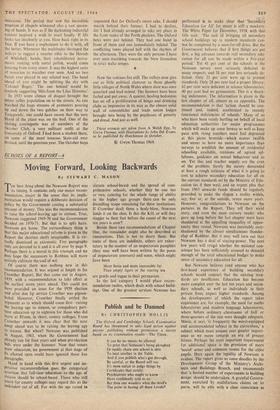A Welsh Eye-3
In Times of Trouble
By GWYN THOMAS
FVEN around my cradle I seemed to detect 1L1 angry fists and raised voices._The miners and their masters had elected to tear the entrails out of each other. About this there was nothing new. For a hundred years the valleys had been given over to industries that were brutally dangerous and dirty, with repression and revolt glaring at each other like imbecile twins. My gripe-water was flavoured with chopped pamphlets. As a pre-sleep tactic, my father would let me stroke a Slight lump on the back of his head. This, he Claimed, had been caused by some ruffianly cossack of a constable who had broken his truncheon on my father's pate during the Tony- Pandy Riots.
My elder brothers, bitter myth-deflaters to a man, swore that the contusion had been caused by a thrown coconut during a drunken revel at Barry Island. But I accepted my father's story and gave him my full sym- pathy when he rattled off the names of at least six men who had got on to the Council merely for having been within earshot of the riot.
The great strikes of 1921 and 1926 Still operate as massive traumas in the less public parts of my psyche. In 1921 some Whitehall Napoleon dispatched a force of infantry, the Yorks and Lanes, to nip insurrec- tion in the bud and protect the rentiers and virgins of the land from spoliation. The soldiers were unsoldierly and amorous fellows. Copulation throve and in our boyish games among the ferns, tripping over lovers and the attendant troupe of telescope- toting voyeurs became a fixed hazard. Often one Would see a passionate Lancastrian being harangued by one of the miners appealing tq him not to exhaust utterly the local supplies of Warmth and to revert, for pity's sake, to the role of running dog of imperialism.
Through that summer we were fed in soup-, kitchens, housed for the most part, and for the extra laugh, in vestries. The diet differed from that of a gaol only in being served by smiling and Splendid women. Never was the sweet tooth of Youth so thwarted. Soup bombarded with Monstrous doughboys was the dish of the day. And this was usually followed by a type of tough, nnsugared rice pudding which was later taken over by Japan as the Mark One of their buna Product, synthetic rubber.
Off and on some jesting sadist would run around the village shouting, 'Fruit salad down the vestry.' We would swoop like gulls around the gates of the kitchens and watch the conven- tional two acres of rice being lifted out of the Ovens. This may earn me a frown from the American Senate but there was Russian money behind this flow of dainties. The miners of the on Basin had a whip-round and sent the valleys a cheque to the tune of 'Solidarity for Ever.'
The lady in charge was the colliery manager's "ire. She would stand on a high platform, correct- ing our clumsier gaffes. Of these, the most fre- quent was to give our digestive tract a truce in the starch-war by sculpting a doughboy into a kind of Easter Island figurine. And occasionally she
would, in a very clear voice, make an announce- ment that cut a permanent groove in my mind. 'Children, tomorrow you will bring your forks. There will be butter beans.' In that age there were a legion of tough things. Those butter beans came about fifth.
When the 1926 battle came around I was in the County School and outside the orbit of, public charity. In most kitchens miracles of division and sharing swarmed like flies. The more astute got the middle cut of the sardine. Our earliest sexual stirrings were shadowed by so consistent a hunger that for years to come the zone's libido had a stammering tongue. The strike, begun in late spring, did not end until the autumn. The weather was flawless. Every day opened and closed like a great flower. The valley slipped back to its primal calm and cleanness. The hillsides were murmurous with groups talking, singing, gamb- ling with buttons or pins.
At school every class witnessed a bijou but solemnly bitter civil war. The miners' sons were for conflict unto death. The sons of tradesmen and other people not affected by the fight were malignantly opposed to the whole business, especially during the General Strike part of the affray, when they had to go without buses and trains. They did the long walk down the valley, working up a fine, reactionary head of steam. I recall, one day, trying to explain to the son of a draper, a torpid, powerful boy, the content of a speech I had heard the night before in the concert room of the Library and Institute. The speaker had given us the exact shade and time of arrival of the Red Dawn. The draper's son listened patiently. He brooded over it for about a week. Then he asked me to repeat what I had said. I gave him the message once more, festooned with a few fresh Trotskyist axioms dredged up from the Institute. He hit me flat. Over the years the wound between us has healed somewhat. But even now I cannot be in his presence without feeling that the world is a little more fissile than it has the right to be.
The strikes left South Wales gutted and stricken. It is still difficult to assess the mind of Wales with- out reference to these outrageous collapses of the social framework. We saw lunacy established among us as an apparently normal stable corn-
panion. We saw, but we didn't quite believe. The experience left our imagination with a perpetual tilt towards the sardonic. Even in the current effervescence of new industry, the last product to be definitely marketed will be confidence. The geology of remembrance is damnably deep and will need to wait overlong for its final textbook. It will prove to be more insolent and unyielding than the rocks and destructive bubbling filth of this eroded and ambulant clinker. And legend has made our particular case more than usually complicated. Ever since the great battles in the North and Midlands of England that sent us haring towards Cardigan Bay, we have felt that east of Chepstow, Ross, Shrewsbury, stood a bale- ful and violent moron as ready to clobber us with penury in this century as he was to do it with battle-axes in the time of the Welsh princes.
The Thirties gave South Wales their political peak. Coal, already a ruptured industry, had stepped down from first place as a battle cry. The world's brow was hot and we were out to fan it with banners. We suggested a possible definition of Wales as a non-stop protest with mutating consonants. Navels dis- tended by resting banner-poles be- came one of the region's major stigmata. During the demonstrations against the Means Test and other bits of crass social legislation that put Britain in deep-freeze during the Baldwin period, we marched almost as a way of life. We were trying to shout a little wisdom and com- passion into the world's ear and the world was as deaf as a post.
Our slogans covered every con- tingency. Many banners would show a pair of staring eyes, indicating man's need of greater insight, and a pair of clasped hands, to symbolise unity. We must have been the first spot outside Asia to send warm greetings to Mao Tse-tung. Smaller causes would always find spokesmen. 'Keep Chepstow Welsh! "Remember Builth Wells ! "Free Beer!' 'Hands off Cwmparc! "Keep Wales vocal!' 'Revive Tonic Sol Fa!' What about Colenso Jones?' This Colenso Jones was a paranoid book- maker from Ferndale, who had accused the police of hounding him and his runners with undue zeal. His case had overtones of the Dreyfus affair.
For the police were not loved in those days. They had a way of flipping you with their white gloves if groups of three or four stood on a pave- ment putting the comb through the world's tangled plight. And at all the major meetings, where you would nearly always get a fast gale of republican rage, anyone with a strong voice and a way of banging it like a torpedo against the back wall of the hall was nourished by the thinkers at the Institute with nuggets of information about every lapse in royal conduct all the way back to Ethelred and even further. And whenever they started beating out their Robespierre .routine the constabulary, in their quaint Prussian-seeming helmets, could be seen making heavy weather of the shorthand notes that would help', later, to send one or more of the lads to stiffish terms in goal. It is a cooling experience to see neighbours vanish into prison for the simple offence of frankness. The totally new relationship between people and police is as pleasant a sight as the factories that have sprouted on the disused tips of yesteryear. I never thought that.they or I would make it.
The political marches were great musical occasions. The period that 'saw the incredible eruption of chapels witnessed also a vast spawn- ing of bands. It was as if the darkening industrial context inspired a wish to react loudly. If life looks too insolently at you, blow back right in its face. If you have a euphonium to do it with, all the better. Whenever the multitudes thronged the valleys to suggest a sweeter ethic to the Herods of Whitehall, bands, their rehabilitated instru- ments reeking with metal polish, would come Pouring from every street. It was the highest ratio of musician to marcher ever seen. And no two bands ever played in any related way. The band ahead of you might be splitting the sky with 'Colonel Bogey.' The one behind would be tenderly suggesting 'Hits from the Lilac Domino.'
In 1935 some climax of disgust brought the entire valley population on to the streets. As one watched the huge streams of protesters pouring up and down the two gulches on their way to Tonypandy, one could have sworn that the very blood of the place was on the boil. One of the visiting contingents was of members of the October Club, a very militant outfit at the University of Oxford. I had been a student there, on some of the most tenuous State-aid ever devised, until the previous year. The October boys requested that for Oxford's sweet sake, I should march behind their banner. I had to decline, for 1 had already arranged to take my place in the front ranks of the Porth phalanx. The Oxford boys were just behind. They had one band in front of them and one immediately behind. The conflicting tunes played hell with the rhythm of the afternoon. They were the only persons I have ever seen marching towards the New Jerusalem in strict waltz tempo.
Now the volcano lies still The valleys now give out as little political clamour as those ghostly little villages of North Wales where slate was once quarried and lead mined. The banners have been furled and put away. A quieter, healing hedonism has set off a proliferation of bingo and drinking clubs as impressive in its way as the almost solid wall of conventicles and trade union lodges brought into being by the psychoses of poverty and dread. And just as well.
These extracts are taken from A Welsh Eye, by Gwyn Thomas. with illustrations by John Dd. Evans, to be published by Hutchinson in October.
© Gwyn Thomas 1964.



































 Previous page
Previous page